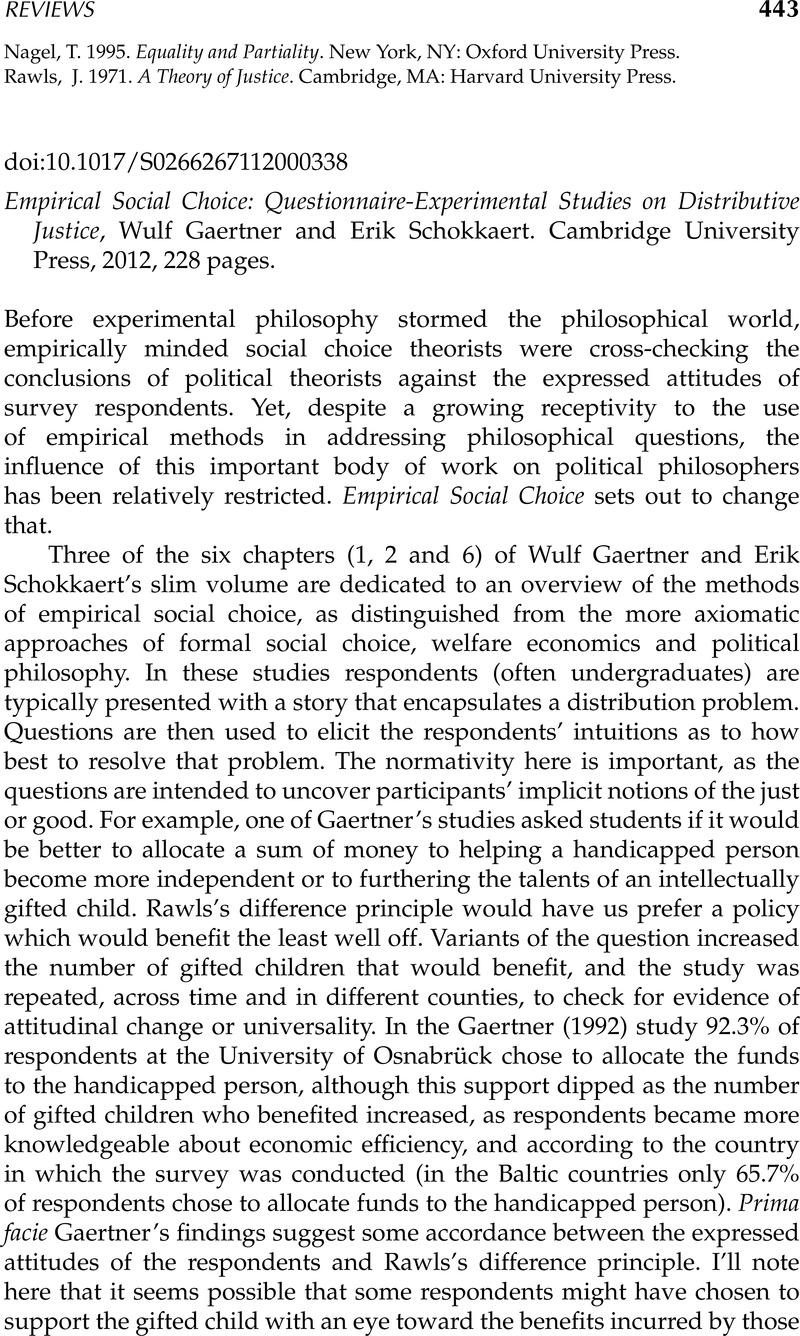No CrossRef data available.
Article contents
Empirical Social Choice: Questionnaire-Experimental Studies on Distributive Justice, Wulf Gaertner and Erik Schokkaert. Cambridge University Press, 2012, 228 pages.
Published online by Cambridge University Press: 28 November 2012
Abstract
An abstract is not available for this content so a preview has been provided. Please use the Get access link above for information on how to access this content.

- Type
- Reviews
- Information
- Copyright
- Copyright © Cambridge University Press 2012
References
REFERENCES
Amiel, Y., Cowell, F.A. & Gaertner, W. 2009. To be or not to be involved: a questionnaire-experimental view on Harsanyi's utilitarian ethics. Social Choice and Welfare 32: 253–274.CrossRefGoogle Scholar
Beckman, S., Formby, J., Smith, J. & Zheng, B. 2002. Envy, malice and Pareto efficiency: an experimental examination. Social Choice and Welfare 19: 349–367.CrossRefGoogle Scholar
Feinberg, J. 1970. Justice and personal desert. In Doing and Deserving. Princeton, NJ: Princeton University Press.Google Scholar
Frohlich, N., Oppenheimer, J. & Eavey, C. 1987. Choices of principles of distributive justice in experimental groups. American Journal of Political Science 31: 606–636.CrossRefGoogle Scholar
Gaertner, W. 1992. Distributive judgments. In Social Choice and Bargaining Perspectives on Distributive Justice, ed. Gaertner, W. and Klemisch-Ahlert, M., Chapter 2. Berlin: Springer Verlag.CrossRefGoogle Scholar
Gaertner, W. & Schwettmann, L. 2007. Equity, responsibility and the cultural dimension. Economica 74: 627–649.CrossRefGoogle Scholar
Gamliel, E. & Peer, E. 2006. Positive versus negative framing affects justice judgments. Social Justice Research 19: 307–322.CrossRefGoogle Scholar
Goodin, R. 1985. The priority of needs. Philosophy and Phenomenological Research 45: 615–625.CrossRefGoogle Scholar
Herrero, C., Moreno-Ternero, J. & Ponti, G. 2010. On the adjudication of conflicting claims: an experimental study. Social Choice and Welfare 34: 145–179.CrossRefGoogle Scholar
Knobe, J. & Nichols, S. 2008. Experimental Philosophy. Oxford: Oxford University Press.CrossRefGoogle Scholar
Konow, J. 1996. A positive theory of economic fairness. Journal of Economic Behavior and Organization 31: 13–35.CrossRefGoogle Scholar
Konow, J. 2001. Fair and square: the four sides of distributive justice. Journal of Economic Behavior and Organization 46: 137–164.CrossRefGoogle Scholar
Lindholm, L., Emmelin, M. & Rosen, M. 1997. Health maximization rejected: the view of Swedish politicians. European Journal of Public Health 7: 405–410.CrossRefGoogle Scholar
Rawls, J. 2005. A Theory of Justice: Original Edition. Cambridge, MA: Belknap Press of Harvard University Press.CrossRefGoogle Scholar
Scanlon, T.M. 1975. Preference and urgency. Journal of Philosophy 72: 655–669.CrossRefGoogle Scholar
Sen, A. 1980. Equality of what? In The Tanner Lectures on Human Values, ed. McMurrin, S., 353–369. Cambridge: Cambridge University Press.Google Scholar
Yaari, M. & Bar-Hillel, M. 1984. On dividing justly. Social Choice and Welfare 1: 1–24.CrossRefGoogle Scholar


